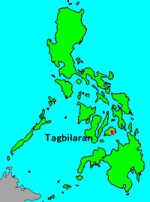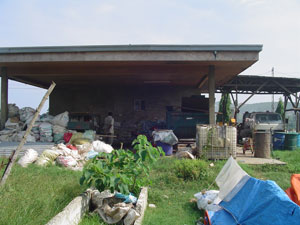Brief introduction of Tagbilaran City

Tagbilaran is the capital city of the island Province of Bohol in the Central Visayas Region, with a population of 91,218 in 2006. The city has a total land area of 3,270 hectares, including about 13 kilometers of coastline, governed through 15 barangays, of which 4 cover the urban area with the remaining 11 comprising the rural uplands . The City prides itself as Bohol Province's gateway of development, particularly as a major eco-tourism destination, with commerce, trading, fishing and agriculture as its major sources of livelihood.
Sustainable Tagbilaran Project (STP)
The Sustainable Cities Programme was implemented in the Philippines through the "Strengthening Local Environmental Planning and Management" (L-EPM) by the Department of Environment and Natural Resources (DENR). The Project was established to strengthen the Local Government Units (LGUs) and enhance their capacities for participatory environmental planning and management at the local level, whilst enhancing the capability of national institutions like DENR and the League of Cities of the Philippines (LCP) to support LGUs in EPM. Through the financial support from the United Nations Development Programme (UNDP) and UN-HABITAT, the three year programme was implemented through a Project Management Coordinating Unit (PMCU) established in the DENR, in partnership with the LCP.

Tagbilaran City was selected as one of the three (3) SCP-EPM demo cities, based on a selection process conducted by the Project Steering Committee (PSC), Inter-Agency Technical Working Group (IA-TWG) and the Project Management Coordinating Unit (PMCU). The project was launched in December 1998 after the Mayor signed the Memorandum of Agreement for the project implementation, committing to localise the Philippine Agenda 21, and strengthen the LGU environmental planning and management capacities. Whilst the Local-EPM project ended in the first quarter of 2002, a Cooperation Agreement between UN-Habitat and the University of the Philippines - School of Urban and Regional Planning (UP-SURP) was signed late 2005 to document the city's experience, lessons learned and good practices in Solid Waste Management, and disseminate these to neighboring cities.
Tagbilaran City Environmental Profile
The first City Environmental Profile was prepared in 1999 through extensive stakeholder discussions, becoming the information baseline for awareness raising, analysis and clarification of the city's most pressing environmental concerns, such as solid waste management, water and air quality management and costal resource management. The TEP was also instrumental during the negotiation of strategies amongst stakeholders, when they reviewed policy options and formulated area specific action plans to strengthen implementation Throughout its preparatory process the Project Team continuously identified and mobilized to further promote the sustainable development of Tagbilaran.
In 2006 the updated Tagbilaran City Environmental Profile was prepared, with revised data on population, agricultural production, infrastructure, tourism, air pollution level, etc., generated in coordination with the City departments. In the process a workshop for the stakeholders was held in May 2006, when the following six (6) issues were highlighted: 1) solid and liquid waste management; 2) coastal resource management; 3) air pollution; 4) green spaces and uptown development; 5) freshwater resource management; and 6) tourism and cultural heritage.
Tagbilaran City Consultation
The first City Consultation was conducted November 23 - 26, 1999, when more than two hundred and fifty (250) multi-stakeholders were invited and approximately eighty percent (80%) participated in the 4-day event. Discussion Groups were organized according to the three (3) issues highlighted in the first Environmental Profile: solid waste management, coastal resource management, and air and water quality management. Task Forces were established to address each of the issues during a follow-up multi-stakeholders orientation workshop. Each Task Force selected a chairman, and members took a "Pledge of Commitment" (witnessed by the EPM Staff) as a visible sign of true commitment to meet regularly to review, develop and implement action plans to address priority sub-issues and concerns on their area of concern.
A second City Consultation was conducted in January 2007, attended by representatives from the government, research institutes, private sector, NGOs and Peoples Organizations; to discuss and agree intervention strategies for the identified issues of air pollution and traffic management, solid waste management, coastal & water resource management, and institutional strengthening. Proposition papers on each subject were presented which analyzed causes, implications and policy options for future strategy development. The City Consultation also established four cross-sectoral Working Groups to continue the discussions through to action plan implementation through demonstration projects.
Key Environmental Issues and Demonstration Projects
- Priority Issues
-
- Solid waste management (SWM)
- Coastal resource management
- Demonstration Projects
-
- - Bio-composting and organic fertilizer production facility in Dampas District.
- Segregation of biodegradable waste at source - Coastal clean-up campaign, (Coastal resource management plan)
- - Bio-composting and organic fertilizer production facility in Dampas District.
Bio-Composting and Organic Fertilizer Production in Dampas District
The demo project seeks to address the increasing amount of solid waste that the city generates, by reducing the amount of biodegradable and recyclable wastes (to about 60% and 15%, respectively) and by re-using these as organic fertilizers. The project beneficiaries are the farming groups and city constituents.
The community, CBOs/ POs and other stakeholders played important roles in its implementation. For example, the group of market vendors is responsible for the segregation of biodegradable waste at the source. The city's Solid Waste Management Office (SWMO) is responsible for the collection of biodegradable waste. Finally, the Bohol Initiators for Sustainable Agriculture and Development, Inc. (BISAD) is directly in-charge of actually operating the bio-composting facility, i.e., from the production process through to promotion and marketing of the finished product (organic fertilizers).
A series of mini-consultation meetings were held in order to promote stakeholder participation. Monitoring is done at regular intervals to evaluate implementation of the demo project against the original work-plan.

The Bio-Composting and Organic Fertilizer Production
facility in Dampas District, Tagbilaran City
Results and Lessons Learned
Successfully created the Tagbilaran City Environmental Management Office (TCEMO) constituted a major step to ensure that city environmental concerns are addressed as an integral part of the city planning and management activities. Headed and supervised by a project coordinator and staffed with a project manager, the TCEMO was assisted by three part-time coordinators for (1) solid, toxic and hazardous waste, (2) Air quality and traffic, (3) Coastal resources, water quality and liquid wastes on temporary assignment to the office. Over time these City environmental management tasks have gradually been lodged within the City Planning and Development Office.
Successfully promoted the involvement & participation of key stakeholders in LGU decision making on priority environmental concerns, and facilitated the establishment of broader partnerships with other government agencies as well as with communities and the private sector. This proved to be fundamental in gaining the commitment and support of civil society groups to implement environment-friendly endeavors (see demo-projects).
Working Group members from civil society groups were able to acquire technical knowledge on coastal waste management, which further strengthened their organization's interest and helped develop advocacy strategies to their members, resulting in regular Coastal Cleaning Campaigns.
The capacities of the LGU were enhanced in different areas, including the establishment of Environmental Management Information Systems & Geographical Information Systems.
Up-scaling from the initial demonstration efforts of the Local EPM Project, a city-wide solid waste management plan is being implemented by the City, including the development of a sanitary landfill as required by new legislation, to be managed by a private company, with essential services like promoting segregation at source, and hauling of wastes to site as counterpart inputs of the City. Following the January 2007 CC, the City has developed a comprehensive water resource conservation and development project concept to specifically address the increasing demands of domestic water for households as well as for the growing industry. Discussions are conducted with potential project partners and investors.
Another important result was the design of a peri-urban neighborhood for the City, using techniques and methods of the SCP/LA21 approach.
Inter-Working Group coordination, especially through the sharing of information, proved essential for the successful implementation of the EPM process. Similarly, the sharing of resources and support institutions made sure that the WG recommendations and actions were mutually supportive and reinforced each other.
Key Contacts and Associates
Mr. Walter Toston
City Administrator
Tagbilaran City
0928-503-0015
Mr. Eduardo Macalandag
City Planning and Development Coordinator
City Government of Tagbilaran
0918-979-2755
Mr. Valentino Gamutin
Legislative Staff, Sangguniang Panlungsod
City Government of Tagbilaran
0917-333-3304




















